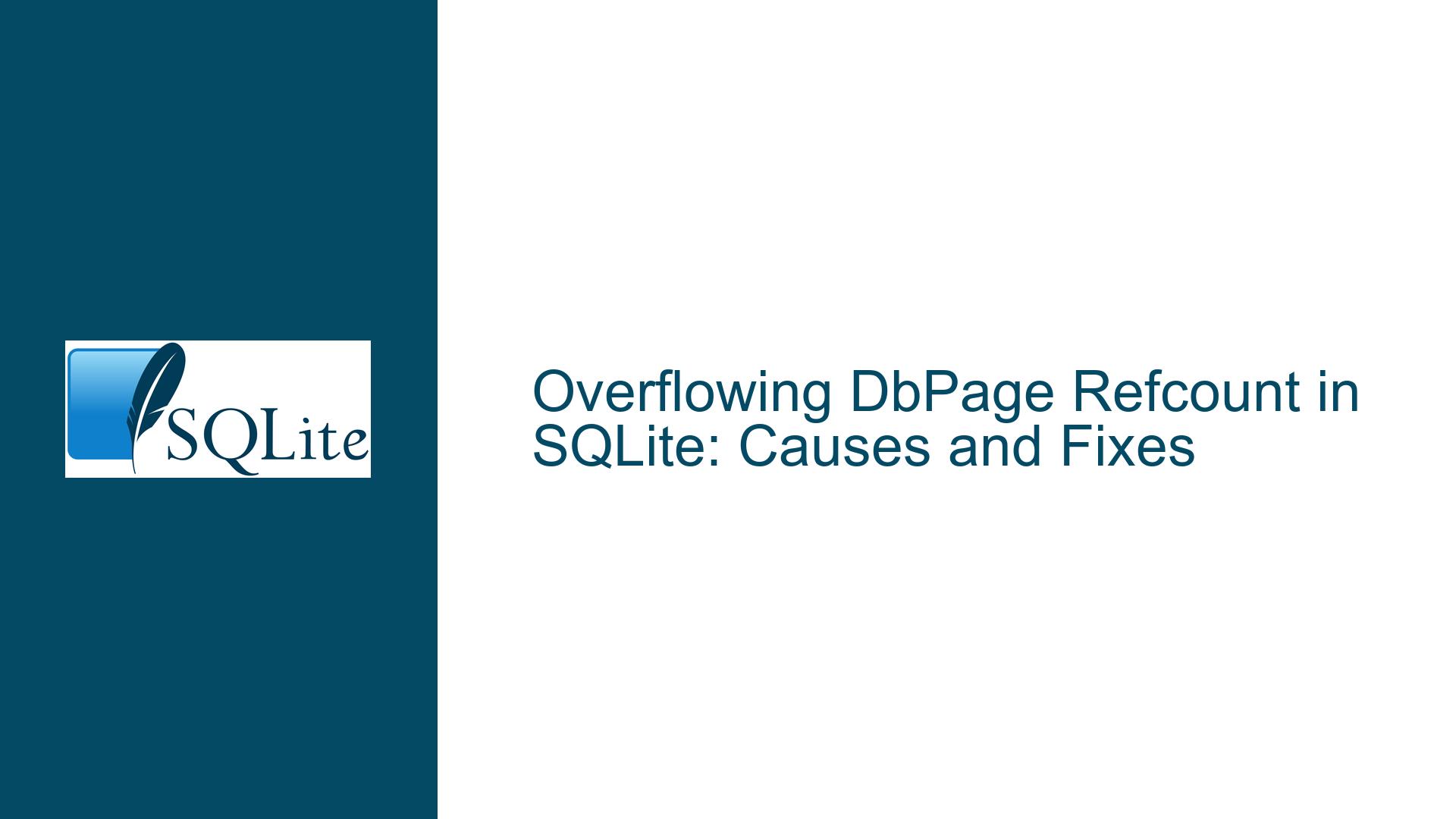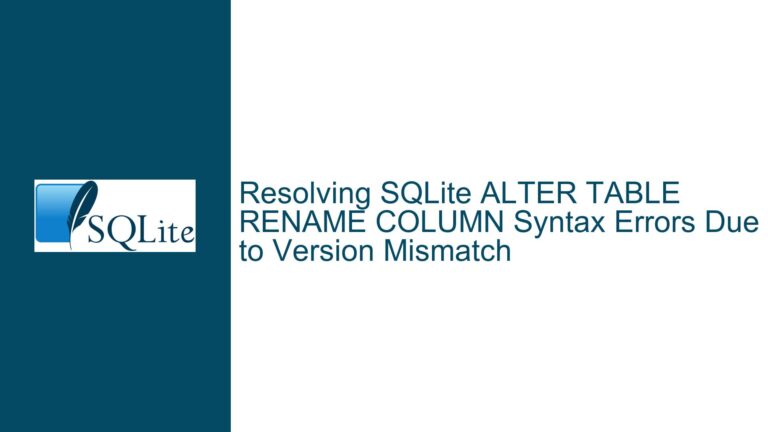Overflowing DbPage Refcount in SQLite: Causes and Fixes
Issue Overview: Overflowing DbPage Refcount in SQLite
The core issue revolves around the DbPage reference count (nRef) overflowing in SQLite, leading to an assertion failure. This occurs when a large number of prepared statements are executed and stepped through, causing the reference count to exceed the limits of its data type (i16, a 16-bit signed integer). The reference count is a critical component of SQLite’s memory management system, ensuring that database pages are not prematurely released while still in use. When the reference count overflows, it wraps around to a negative value, triggering an assertion failure in the sqlite3PagerGetData function.
The problem manifests under specific conditions: a table with a single row of data is created, and a SELECT statement is prepared and stepped through repeatedly. After approximately 32,768 iterations, the reference count overflows, causing the assertion pPg->nRef > 0 || pPg->pPager->memDb to fail. This assertion ensures that a database page is either referenced (nRef > 0) or part of an in-memory database (memDb). When the reference count overflows, it becomes negative, violating this condition.
The issue is particularly relevant in scenarios where SQLite is used in high-throughput environments, such as web servers or data processing pipelines, where a large number of prepared statements are executed in rapid succession. The problem is exacerbated by the use of a 16-bit signed integer for the reference count, which limits the maximum number of references to 32,767 before overflow occurs.
Possible Causes: Understanding the Reference Count Overflow
The reference count overflow in SQLite’s DbPage structure is primarily caused by the use of a 16-bit signed integer (i16) to store the reference count. This design choice limits the maximum reference count to 32,767, after which it wraps around to -32,768. The overflow occurs because the reference count is incremented each time a prepared statement is stepped through, and it is not decremented until the statement is finalized or reset.
Several factors contribute to this issue:
High Throughput of Prepared Statements: In environments where a large number of prepared statements are executed in rapid succession, the reference count can quickly reach its maximum value. This is particularly problematic in scenarios where prepared statements are not finalized or reset promptly, allowing the reference count to accumulate.
Long-Lived Prepared Statements: Prepared statements that remain active for extended periods without being finalized or reset can contribute to the reference count overflow. This is common in applications that maintain a cache of prepared statements for performance reasons, as the reference count for each statement continues to increase with each execution.
Insufficient Reference Count Management: The current implementation of SQLite does not provide mechanisms to prevent reference count overflow. While the reference count is incremented during statement execution, it is not decremented until the statement is finalized or reset. This lack of proactive management increases the risk of overflow in high-throughput environments.
Use of 16-Bit Signed Integer for Reference Count: The choice of a 16-bit signed integer for the reference count is a fundamental limitation. While this may have been sufficient for earlier versions of SQLite or less demanding use cases, it is inadequate for modern high-throughput applications. The use of a larger data type, such as a 32-bit integer, would mitigate the risk of overflow.
Assertion Failure in
sqlite3PagerGetData: The assertion failure insqlite3PagerGetDatais a direct consequence of the reference count overflow. The assertion checks that the reference count is either positive or that the page is part of an in-memory database. When the reference count overflows and becomes negative, this condition is violated, triggering the assertion failure.
Troubleshooting Steps, Solutions & Fixes: Addressing the Reference Count Overflow
Addressing the reference count overflow in SQLite requires a combination of immediate fixes and long-term solutions. The following steps outline the recommended approach to resolving the issue:
Immediate Workaround: Finalize or Reset Prepared Statements: The most straightforward workaround is to ensure that prepared statements are finalized or reset promptly after use. This prevents the reference count from accumulating and reduces the risk of overflow. In high-throughput environments, it may be necessary to implement a mechanism to track and manage prepared statements, ensuring that they are finalized or reset as soon as they are no longer needed.
Increase Reference Count Data Type Size: A long-term solution is to increase the size of the reference count data type from a 16-bit signed integer (
i16) to a 32-bit signed integer (i32). This would significantly increase the maximum reference count, reducing the risk of overflow in high-throughput environments. This change would require modifications to the SQLite source code, particularly in theDbPagestructure and related functions that manipulate the reference count.Implement Reference Count Saturation: Another approach is to implement reference count saturation, where the reference count is capped at a maximum value (e.g., 32,767) and does not overflow. This would prevent the reference count from becoming negative and triggering the assertion failure. While this approach does not eliminate the risk of reaching the maximum reference count, it ensures that the reference count remains within valid bounds.
Optimize Prepared Statement Cache: In applications that use a cache of prepared statements, it is important to optimize the cache to minimize the accumulation of reference counts. This can be achieved by implementing a least-recently-used (LRU) eviction policy, where the least recently used statements are finalized or reset when the cache reaches a certain size. This ensures that the reference count for each statement is periodically reset, reducing the risk of overflow.
Monitor and Log Reference Counts: Implementing monitoring and logging of reference counts can help identify potential issues before they lead to overflow. By tracking the reference count for each prepared statement, it is possible to detect patterns of accumulation and take corrective action, such as finalizing or resetting statements that are approaching the maximum reference count.
Review and Update SQLite Version: Ensure that the application is using the latest version of SQLite, as newer versions may include fixes or improvements related to reference count management. If the issue persists in the latest version, consider contributing the proposed fixes to the SQLite project or seeking assistance from the SQLite community.
Custom Memory Management: For applications with specific performance requirements, consider implementing custom memory management for prepared statements. This could involve overriding SQLite’s default memory management functions to provide more control over reference counts and ensure that they are managed appropriately.
Testing and Validation: After implementing any of the above solutions, it is important to thoroughly test the application to ensure that the reference count overflow issue is resolved. This includes stress testing the application with a high number of prepared statements to verify that the reference count remains within valid bounds and that no assertion failures occur.
By following these troubleshooting steps and implementing the recommended solutions, it is possible to address the reference count overflow issue in SQLite and ensure the stability and performance of the application in high-throughput environments.






